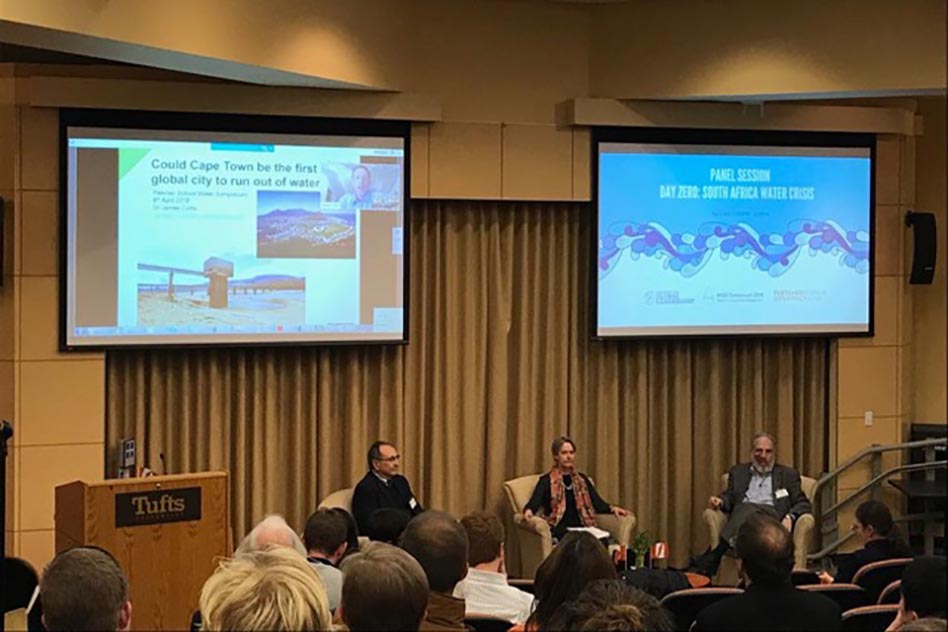
Day Zero: Water Crisis South Africa
Joint Program Research Scientist Kenneth Strzepek highlights need for collaborative solutions on Tufts Water: Systems, Science and Society Symposium panel
Panel Summary Day Zero: Water Crisis South Africa from the WSSS Symposium, April 6 2018
Cape Town is at the center of a major drought which began in Southern Africa in 2015 and continues through today as annual rainfall in the region has decreased. Once viewed as a leader of water management, the city of Cape Town is under pressure to ration distribution and use as water reserves approached 13.5% total capacity. Also enabling this problem is Cape Town's growing population rate and water usage per person, which increased at a faster rate than the ability to store water since the beginning of the twenty-first century.
Predictions of reaching the low 13.5% capacity level were initially set for April 2018 with the label of Day Zero in the city of 4 million people, pressuring the local government and communities to band together. Attempting to mitigate the water crisis, policy was created to direct the city's water distribution to selected taps and rationed each person to 50 liters (13.2 gallons). For perspective, the average amount of water used per person in Massachusetts is 246 L (65 gallons) and a five-minute shower typically uses between 10 and 25 gallons. After a period of rationing, the instillation of other policies, and much needed rainfall, new estimates have pushed the concept of Day Zero to 2019.
While the water crisis in South Africa is not the first nor the last, the resulting impact on the major city of Cape Town sets a precedence for water security, urban development, and response in the modern era. As people throughout the region relocate in search for water, host communities struggle to supply the increased population with not only water, but other resources, housing, and livelihoods. To do this, local and national governments work with experts to create solutions to provide efficient water distribution and decrease wastage, while NGOs create awareness within the communities and prevent a state of fear.
A conversation discussing these matters was brought together entitled Day Zero: Water Crisis South Africa by the collective effort of the Fletcher School's Science Diplomacy Club and Tufts University's WSSS Symposium on Friday April 6. The panel was moderated by Dr. Ann Rappaport of the Urban and Environmental Policy Department at Tufts University with presenters Dr. James Cullis of Aurecon South Africa, Dr. Kenneth Strzepek of Harvard Kennedy School and the MIT Joint Program on the Science and Policy of Global Change, and Dr. Lawrence Susskind of MIT.
Based in South Africa, Cullis started the conversation by describing the present situation which Cape Town faces: the water levels and timeline, rationing of water and policy, and the ability to conserve. Strzepek followed this with a discussion on the economic developments surrounding the water crisis and the rising concerns of efficient water use in agriculture, as 62% of South Africa's water, while only producing 4.32% of the nation's GDP. Finally, Susskind emphasized the need of collaboration to occur between the communities and the policy makers to ensure policy focused on the various communities throughout Cape Town as each has specific needs and interests.
The question and answer period led to further discussion between the panelists, which brought to light viewpoints, opportunities, and future collaborative efforts. Susskind touched on the point that nations and states sell water at a set price, leading to an imbalance between different socio-economic groupings. He and Cullis also discussed the pros and cons of increased desalinization plant research and development for Cape Town and other coastal communities as alternatives to water tables and rain. By renovating infrastructure water will be used more efficiently, allowing for the redistribution of unneeded resources to other sectors and regions throughout the nation.
Echoing thoughts Susskind made earlier, Strzepek ended the discussion with the need for collaboration by representatives from the varying levels of government, development, and society. Joining the various members and interests of these groups, policy and projects can be created with investment from each, leading to further successes across the board. This call for a joint effort is more effective in the creation of successful, lasting legislation and projects. What remains to be seen is the length of time current water restrictions in South Africa endure. Cullis is hopeful that the near future allows the citizens of Cape Town to increase daily rations from 50 liters of water (13.2 gallons) per day to 150 liters (39.6 gallons) in the near future.
The Science Diplomacy Club, led by Jonathan Keenan would like to thank the Institute of Global Leadership for providing the means to have Dr. Cullis join the discussion, the speakers and Ann Rappaport for moderating, and the WSSS Symposium team for collaborating in organizing the panel and the symposium as a whole. Without this combined effort, this discussion would not have occurred, nor subsequent conversations have started.
Photo: Joint Program Research Scientist Kenneth Strzepek (left) highlights need for collaborative solutions in Tufts Water: Systems, Science and Society (WSSS) Symposium panel (Photo courtesy of Jonathan Keenan)
